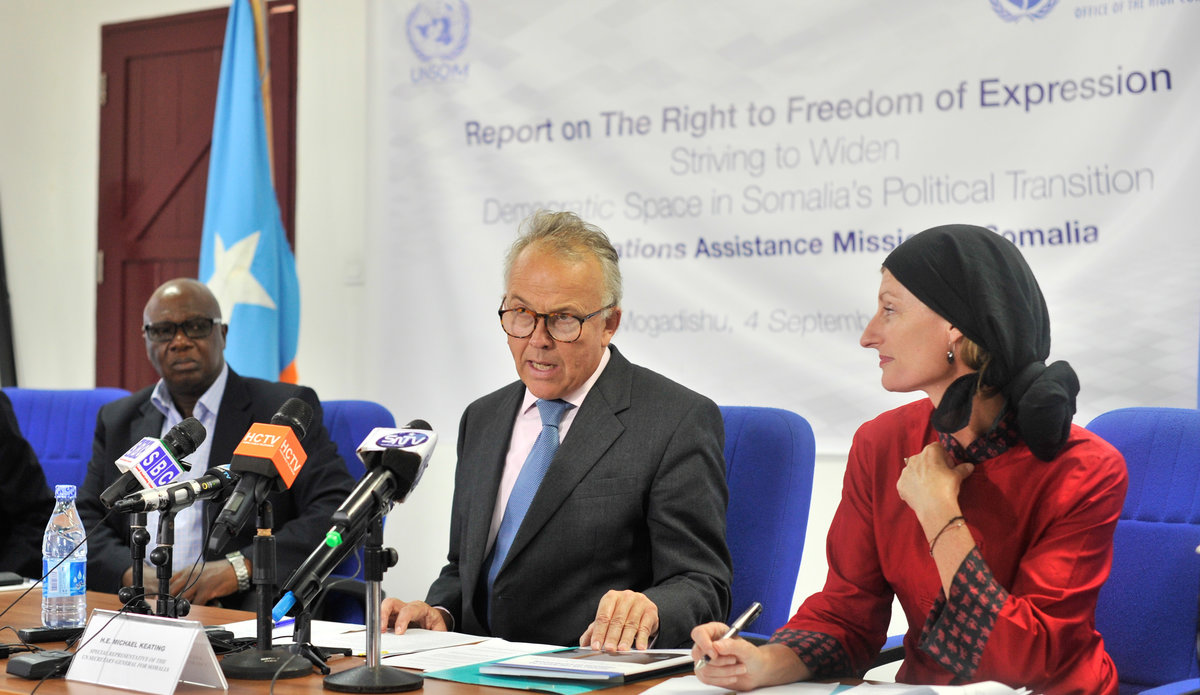UN Report says freedom of expression is critical to Somalia’s political transition
A UN report on freedom of expression in Somalia has welcomed the country’s recent progress in making government more accountable and widening political space for Somali citizens to air their views.
But the report also draws attention to the continuing restrictions on freedom of expression posed by killings, arrests and harassment of journalists, human rights defenders and political leaders.
The first ever UN report on human rights in Somalia was released in Mogadishu today by the Special Representative of the UN Secretary General (SRSG) for Somalia Michael Keating, and it reviews Somalia’s record on freedom of expression issues over a four-year period dating back to 2012.
“We thought this was the right time to emphasize the importance of freedom of expression to Somalia’s political future as we enter into an electoral process in the coming weeks. Freedom of expression is good for accountability. It’s good for stability. It is good for security, and that is why we wanted to release it now,” SRSG Keating said.
Produced jointly by the UN Assistance Mission in Somalia (UNSOM) and the Office of the UN High Commissioner for Human Rights, the 59-page report cites important measures that have strengthened the legal framework for human rights such as the passage of a federal media law last January and a National Human Rights Commission law in August.
But the document also criticizes what Mr. Keating called “egregious examples of the denial of freedom of expression.”
“The UNSOM Human Rights and Protection Group documented the killings of 30 journalists and media workers in Somalia between August 2012 and June of this year,” said Mr. Keating.
“UNSOM also recorded 120 instances of arbitrary arrest and detention of journalists, media workers and owners of media outlets by members of Somalia’s security forces,” he added.
The report also highlights violence against political leaders that resulted in the assassination of at least 18 members of parliament since 2012, further compounding restrictions on freedom of expression.
“The Federal Government should review and withdraw laws and practices that currently restrict and endanger the right to freedom of expression. The Federal Government should bring the country’s 2016 media law in line with regional and international norms and standards,” the SRSG urged.
The report makes a series of recommendations aimed at improving the climate for freedom of expression in Somalia. It calls for the regulation of the National Intelligence and Security Agency (NISA) to deter recurring human rights violations by its agents against politicians, journalists and human rights defenders.
The report also calls for the repeal of a section of the media law that criminalizes the “dissemination of false news”. It urges the Federal Government of Somalia to take steps to guarantee women the right to full participation in this year’s electoral process and one-person, one-vote elections envisioned for 2020.
The report emphasizes the need for the Federal Government to “promptly” establish an independent National Human Rights Commission, which is intended to play a key role in protecting and promoting the rights of all Somalis.
Kirsten Young, the Chief of the UNSOM Human Rights and Protection Group, said the report will serve as a key benchmark for monitoring the state of freedom of expression in the future. “This report will be used to measure progress against the commitments Somalia has made this year,” she said.
Somalia was reviewed this year by the UN Human Rights Council under its Universal Periodic Review process and pledged to implement a lengthy list of recommendations. A midterm review of the country is due in two years’ time.
 UN
UN





